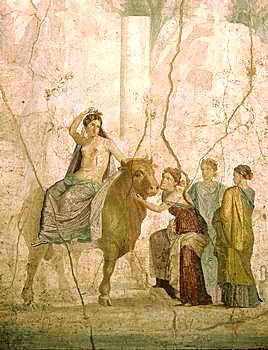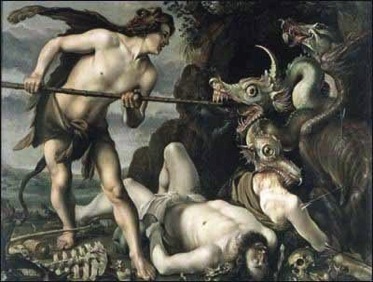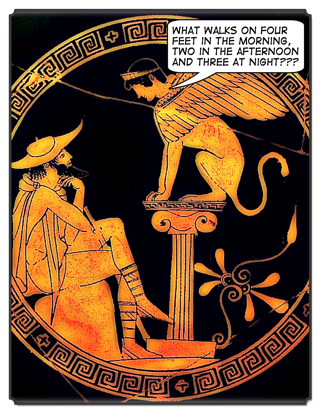The Theban Plays


The Theban Plays




After this, Cadmus had to serve Ares for a period of time to pay for the death of the serpent. When he was freed, he married Harmonia, daughter of Ares and Aphrodite. Cadmus and Harmonia had four daughters. Cadmus and Harmonia reigned a long time, civilizing their people and introducing the knowledge of writing. Eventually they went away to northwest Greece where Cadmus became king of the IIlyrians; at the end of their lives they both turned into great harmless serpents (this is the story told by Euripides and Ovid) or were sent by Zeus to Elysium (a detail added by Apollodorus). As serpents or as inhabitants of Elysium they were ancestors worshiped by their descendants, and their departure from Cadmeia symbolizes their change from mortal to heroic or divine status.
Cadmus was succeeded as king by his grandson Pentheus. Although Cadmus had favored the fledgling god, Dionysus, and allowed the Dionysian rites in Thebes. Pentheus banned the rites, and arrested and imprisoned the god. Dionysus escaped, and caused the women of the Theban royal house to freak out in a Dionysian frenzy. Pentheus climbed a tree to spy on the women, who tore him to pieces.

Another Family With Issues!


The story of the House of Thebes was a popular cycle of myths among the Greeks. Thebes was an important city in Euboea in Greece. The great citadel of Thebes was called Cadmeia, named after the hero who was considered to be the founder of Thebes, Cadmus. Cadmus was the son of Agenor, the king of Tyre and the brother of Europa. Zeus became infatuated with Europa and decided to seduce her. He transformed himself into a bull. When Europa and her attendants were out picking flowers, she saw the bull and decided to ride him. When she climbed on the bull, Zeus took off with her across the Mediterranean to the island of Crete. Once safely on the island, Zeus revealed his true identity to Europa and made her the first queen of Crete.

Agenor sent Cadmus to search for his sister. When Cadmus got to Delphi, he asked the Oracle where Europa had gone, and was informed by Apollo not to worry about his sister. Apollo told Cadmus to follow a cow until she laid down to rest, and found a city on that spot. Cadmus was also required to sacrifice the cow in order to dedicate his new city.
To make a sacrifice, Cadmus needed water. He sent his companions to a spring nearby to draw water, but the spring was guarded by a serpent that belonged to (or in some stories, was a son of) Ares, the god of war. The snake killed some of Cadmus’ companions, so Cadmus fought and killed the serpent. Athena advised Cadmus to plant the teeth of the serpent. When he did so, armed warriors grew out of the ground and began to slaughter each other. Cadmus was able to save five of them. From these five men, called the Spartoi, came the noble families of Thebes.
Cadmus slays the Dragon, Hendrick Goltzius (1558-1607)





The House of Labdacus
After Pentheus, a new dynasty was founded by Labdacus who may have been a grandson of Cadmus. Labdacus fought a war with Athens and lost the war and his life. He was succeeded by his infant son Laius. Lycus, a great-someodd-uncle of Laius, assumed the regency, exiled the young Laius and then made himself king, reigning for twenty years; Lycus was son of one of the five Spartoi.
In exile Laius was hospitably received by Pelops, king of Pisa in the Peloponnesus. Laius became infatuated with a young hero named Chrysippus. He persuaded the young man to drive a chariot in the Nemean games, but after Laius got Chrysippus out of Pisa, he raped him. In doing so, Laius violated the rules of hospitality (xenia), and committed an impious crime (both rape and a homosexual act). As a result, the gods cursed Laius, his family and the city of Thebes. Here is another example of a hero whose drive for self-gratification makes him commit an act of hubris and brings down divine retribution that effects not only him, but his family and community.
After the Chrysippus business Laius married Jocasta, the daughter of one of the Spartoi. Laius received an oracle that told him that he must not have a child, because his offspring would kill him and marry Jocasta. Laius avoided having sex with Jocasta in order to foil the dire oracle. But one night he became drunk and lay with Jocasta, which resulted in the birth of a son, who was named Oedipus. Laius ordered the infant to have his feet bound and to be exposed on Mount Cithaeron, but he was taken by a shepherd and given to King Polybus and Queen Merope of Corinth who raised him to adulthood.


After growing to manhood, Oedipus went to see the Oracle, who told him to avoid his mother and father, because if he returned home, he would surely kill his father and marry his mother. Oedipus did not return to Corinth. Instead he began to wander north. On the road, Oedipus ran into a fellow who was on his way to Delphi. They argued about right-of-way, and fought. Oedipus killed Laius, and moved on to Thebes. When he arrived he was accosted by the Sphinx, a mythical monster who stopped travelers and made them answer a riddle. If the stranger was wrong, the Sphinx ate him. Oedipus answered the riddle successfully and banished the monster. He was greeted at Thebes as a hero, and since the old king was dead, Oedipus was declared king. He married the old king’s widow, Jocasta, and, of course, fulfilled the Oracle’s pronouncement. In complete ignorance of the fact, Oedipus had killed his father and married his mom!

While the various sins, transgressions and curses of the Theban house are pretty mild by comparison to the horrific nastiness (not to mention the culinary excesses) of the House of Atreus. Nevertheless, the Theban rulers managed to pile up some pretty bad stuff. And it doesn’t end here. Whereas the Oresteia marks the resolution of the curse of the Atreides, the Oedipus story (the first play), marks a sort of mid-point. We will discuss more of the curse of the House of Thebes as we look at two plays of Sophocles that use the Theban Cycle for their subject matter.
The Plays
Although the three plays by Sophocles are usually published as a trilogy, they are, in fact individual plays from three different trilogies taken from the Theban Cycle. The Antigone was produced around 441 B.C., Oedipus Rex (or Oedipus Tyrannus) may have first been performed around 430 B.C., and Oedipus at Colonus (which you will not be assigned) was probably produced in 401 B.C. Since they were produced as parts of three different trilogies, a pervasive and contiguous theme is absent from the plays. But, from our point of view Oedipus Rex and Antigone contain themes that fit well with our exploration of the tension between the values of the hero (or individual), the oikos, and the state (polis).
Sophocles
Sophocles was born a few years before the Battle of Marathon into a wealthy family of Colonus Hippius, a small community in Attica a few miles north of Athens. In 468, Sophocles took his first victory in the City Dionysia, defeating the reigning Athenian playwright Aeschylus. The latter moved to Syracuse shortly thereafter and tradition has it that he left Athens embarrassed by his defeat by Sophocles. As you can see from the Wikipedia entry, Sophocles was active in the public and political life of Athens practically down to his death at the age of 90. He not only wrote plays, but he performed in them as well, and was apparently nearly as famous for his performances as he was for the plays that he wrote. He was also, perhaps, the most admired and respected of all of the playwrights among Athenians. Of the hundred of so plays that Sophocles wrote during a long and productive career, only seven have survived.
